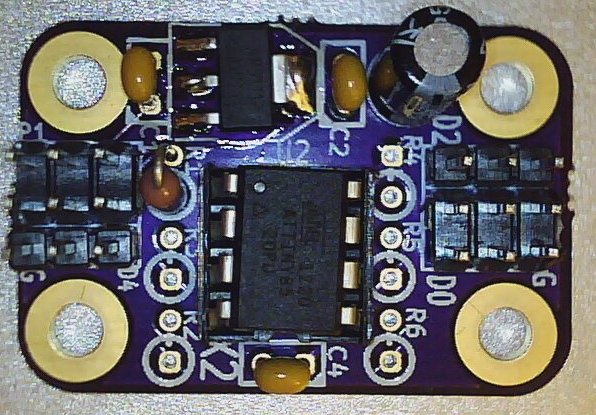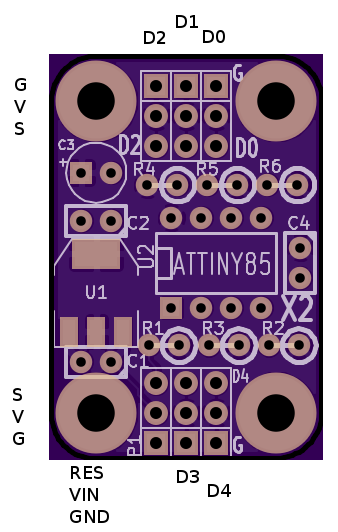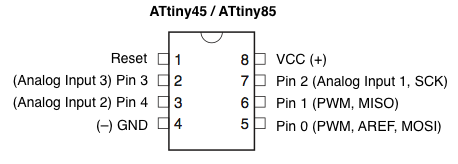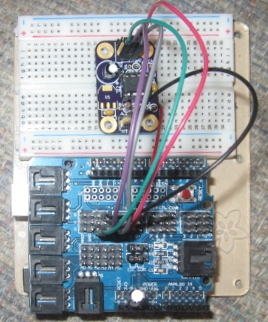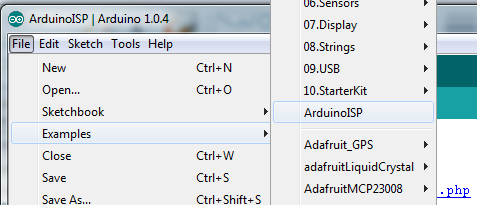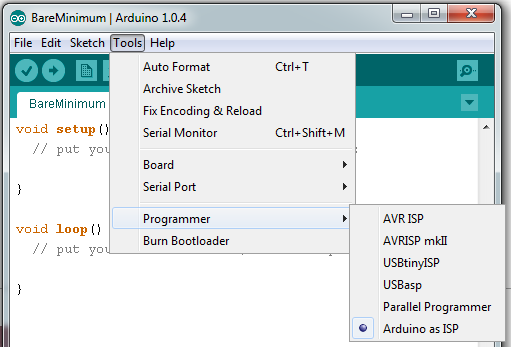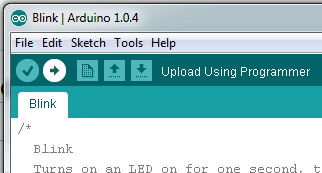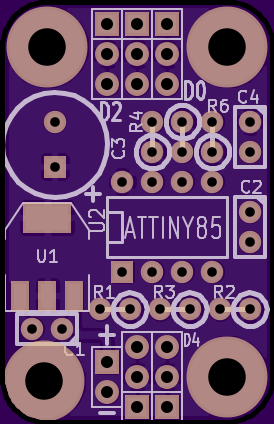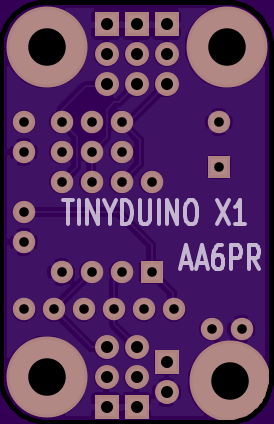Difference between revisions of "TinyDuino85"
Blwikiadmin (talk | contribs) |
Blwikiadmin (talk | contribs) |
||
| (7 intermediate revisions by the same user not shown) | |||
| Line 22: | Line 22: | ||
The mapping of connector pins to the Arduino signals are: | The mapping of connector pins to the Arduino signals are: | ||
| − | TinyDuino85-X2-pins.png | + | [[File:TinyDuino85-X2-pins.png]] |
=== GVS Connectors === | === GVS Connectors === | ||
D0-D4 GVS connectors for each of the lines. | D0-D4 GVS connectors for each of the lines. | ||
| − | + | <pre> | |
Pin Description | Pin Description | ||
1 Ground | 1 Ground | ||
2 Vcc | 2 Vcc | ||
3 Signal | 3 Signal | ||
| + | </pre> | ||
| + | |||
=== P1 Connector === | === P1 Connector === | ||
The P1 connector brings power into the card (for use with the Voltage Regulator) and allows access of the reset line (needed for external programming). | The P1 connector brings power into the card (for use with the Voltage Regulator) and allows access of the reset line (needed for external programming). | ||
| − | + | <pre> | |
Pin Description | Pin Description | ||
1 GND | 1 GND | ||
2 VIN | 2 VIN | ||
3 RESET | 3 RESET | ||
| + | </pre> | ||
== Mapping Arduino Pins to TinyDuino85 pins == | == Mapping Arduino Pins to TinyDuino85 pins == | ||
| − | + | <pre> | |
ATTiny85 Pin PWB Marking Arduino function | ATTiny85 Pin PWB Marking Arduino function | ||
1 P1-3 Reset | 1 P1-3 Reset | ||
| Line 50: | Line 53: | ||
6 D1 Digital Pin 1 | 6 D1 Digital Pin 1 | ||
7 D2 Digital Pin 2 | 7 D2 Digital Pin 2 | ||
| − | + | </pre> | |
| − | ATtiny45-85.png | + | [[File:ATTiny85 Pinout.PNG]] |
| + | |||
| + | [[File:ATtiny45-85.png]] | ||
== X2 Improvements/Checkout == | == X2 Improvements/Checkout == | ||
| Line 67: | Line 72: | ||
[[File:TD85-IMG 3336.JPG]] | [[File:TD85-IMG 3336.JPG]] | ||
| − | ATTiny85 Programming | + | * ATTiny85 Programming |
| − | Setup for programming from an Arduino UNO. | + | ** Setup for programming from an Arduino UNO. |
| − | TinyDuino85 pins hook up easily to the Arduino UNO with a Sensor Shield. | + | ** TinyDuino85 pins hook up easily to the Arduino UNO with a Sensor Shield. |
| − | Using an Adafruit plate to hold all of the parts. | + | ** Using an Adafruit plate to hold all of the parts. |
| − | Programming an ATTiny using Arduino 1.0.1 | + | * Programming an ATTiny using Arduino 1.0.1 |
| − | Use an Arduino as an ISP (programmer) to an ATtiny85 | + | * Use an Arduino as an ISP (programmer) to an ATtiny85 |
| − | Use ArduinoISP sketch in the "host". | + | * Use ArduinoISP sketch in the "host". |
| − | + | * [[Arduino Sensor Shield]] | |
| − | + | [[File:ArduinoISPSketch.png]] | |
| − | |||
| − | Hold down shift key when using upload button. | + | * Set the Programmer to "Arduino as ISP" |
| − | Text will change to "Upload using Programmer". | + | |
| − | ArduinoIDEUpload.png | + | [[File:ArduinoAsISP.png]] |
| + | |||
| + | * Hold down shift key when using upload button. | ||
| + | ** Text will change to "Upload using Programmer". | ||
| + | |||
| + | [[File:ArduinoIDEUpload.png]] | ||
== X1 Board == | == X1 Board == | ||
| − | [[File:TinyDuino85FrontX1 | + | [[File:TinyDuino85FrontX1.png]] [[File:TinyDuino85BackX1.png]] |
| − | |||
| − | [[File: | ||
== X1 Checkout == | == X1 Checkout == | ||
Latest revision as of 14:56, 26 July 2022
Contents
TinyDuino85
Features
The current version of this board is Rev X2. This board is an ATTiny85 Arduino-Compatible GVS design. My first version of this card, TinyDuino85 Rev X1 was pretty good, but it had a few minor issues which this version corrects.
TinyDuino85 is an Atmel ATTiny85 based design. Distinctive features are:
- Four mounting holes - standard 4-40 hardware
- GVS Connectors for D0-D5 (5-lines)
- X2 version adds Reset pin to power connector for ease of downloading
- Installable resistors for pullups on lines (1-Wire or LDR sensors can be done easily)
- Small form factor card easily fits into small Altoids tin
- On-board +5V voltage regulator
- SMT regulator uses the top layer of the board as heat spreader
- Rounded corners on the PCB for easy mounting
Connectors
The mapping of connector pins to the Arduino signals are:
GVS Connectors
D0-D4 GVS connectors for each of the lines.
Pin Description 1 Ground 2 Vcc 3 Signal
P1 Connector
The P1 connector brings power into the card (for use with the Voltage Regulator) and allows access of the reset line (needed for external programming).
Pin Description 1 GND 2 VIN 3 RESET
Mapping Arduino Pins to TinyDuino85 pins
ATTiny85 Pin PWB Marking Arduino function 1 P1-3 Reset 2 D3 Digital Pin 3/Analog A3 3 D4 Digital Pin 4/Analog A2 5 D0 Digital Pin 0 6 D1 Digital Pin 1 7 D2 Digital Pin 2
X2 Improvements/Checkout
Reset line added to power pin and wiring for power in pin is set to be the same as GVS connectors Bottom left corner mounting hole close spacing Reduced footprint of big cap Smaller board footprint Application My initial application is to use this in my Room Fan Controller design since that design only requires 2 inputs (from LDR Sensor and Temperature sensor) and one output (AC relay). The code fits into 8K of memory.
Programming
- ATTiny85 Programming
- Setup for programming from an Arduino UNO.
- TinyDuino85 pins hook up easily to the Arduino UNO with a Sensor Shield.
- Using an Adafruit plate to hold all of the parts.
- Programming an ATTiny using Arduino 1.0.1
- Use an Arduino as an ISP (programmer) to an ATtiny85
- Use ArduinoISP sketch in the "host".
- Arduino Sensor Shield
- Set the Programmer to "Arduino as ISP"
- Hold down shift key when using upload button.
- Text will change to "Upload using Programmer".
X1 Board
X1 Checkout
- Programming per the above produces an error which the pages all say to ignore:
avrdude: please define PAGEL and BS2 signals in the configuration file for part ATtiny85
- Had to add a wire to the programmer card to get to the reset line. Should bring this to a header pin
- Bottom left corner cut too close
- Cap footprint on PCB is way too big
